20 Great Horror Films Directed By Women of Color
Women of color have directed some of the most unique, terrifying, and gorgeous films of the genre. On this list, are 20 of their greatest horror films.
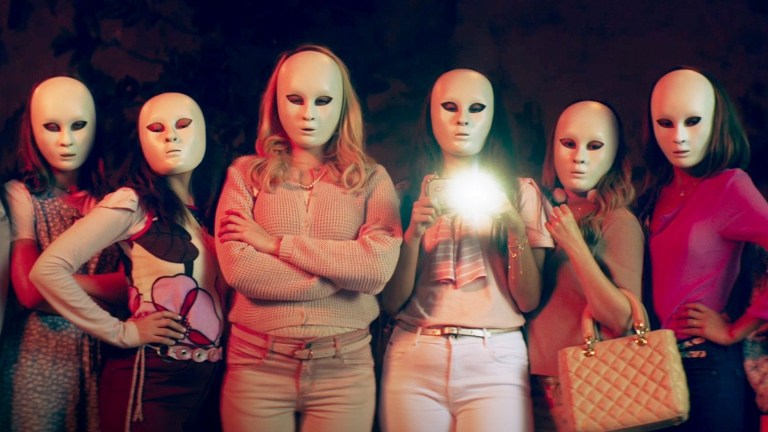
Historically, women in horror films have been hypersexualized, painted as vulnerable and powerless damsels in distress, or given the insane treatment, because…men. When you reflect on the bloodiest and most violent scenes in the genre, they often involve a woman. There are decades worth of horror movies of women being brutalized, objectified, villainized, and reduced to tropes. This isn’t to say that there aren’t powerful and complex female characters in horror, but even in those great films, it’s usually always a man telling a woman’s story. Women are, to this day, so underrepresented behind the camera.
Tragically, like most things in life, the horror genre is predominantly governed by white men. Look at any list of horror movies, and it’s what you’ll see—mostly white male directors. Even as the genre has become more diversified, conversations about horror filmmakers are still largely centered around men. The spotlight is usually on directors like John Carpenter, David Cronenberg, Dario Argento, Jordan Peele, Ari Aster, Robert Eggers, and Guillermo del Toro. They may be absolute icons, but it’s time we let their female colleagues come to the forefront. Horror isn’t just for the boys!
Although there has been a rise in feminist discussion revolving around female horror filmmakers, more should be exclusively dedicated to women of color. Their stories are few and far between, but carry such a deep resonance for many. To tell such unique stories, these talents hone in on the female experience, on their own understanding as women of color, on their culture, on their love for horror, and oftentimes on generational trauma. Some of these films are such intimate, meticulously crafted works. Others make for fun, wild rides. They’re all long overdue for their recognition.
Curated below are 20 great horror films directed by women of color, from both national and international talents.
Eve’s Bayou (1997)
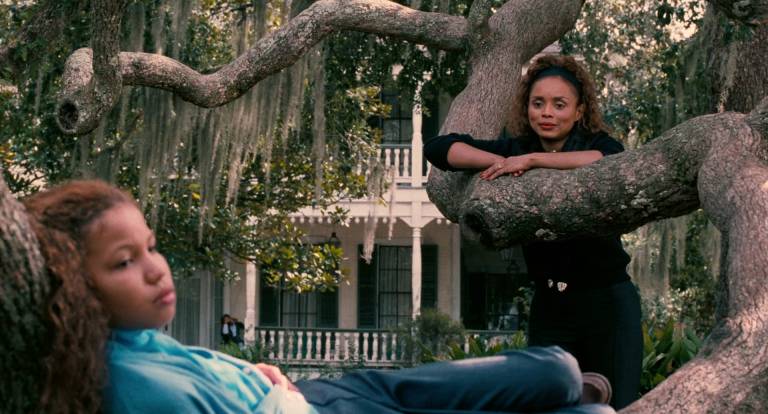
Kasi Lemmons wrote and directed this Southern gothic drama. The period horror is set in 1960s rural Louisiana, in a small town outside of New Orleans, and focuses on the affluent Batiste family. After witnessing her father, the well-respected Dr. Louis Batiste (Samuel L. Jackson), cheating on her mother with a family friend one night, 10-year-old Eve (Jurnee Smollett) learns that there may be more unspeakable things happening in her home. Dark revelations are unearthed throughout the movie, creating a chain of events that we know from the opening narration will lead to her father’s death. Eve’s Bayou makes gripping cinema—it’s hard to believe it’s a directorial debut.
Jennifer’s Body (2009)

Critics and audiences of the time be damned, the cultural impact of Jennifer’s Body as a now beloved cult classic proves the movie’s worth. Karyn Kusama directs this gem that captures girlhood written by Diablo Cody about a high school cheerleader transformed into a succubus. Jennifer Check (Megan Fox) needs the flesh of teenage boys to survive, and she won’t let anyone, not even her best friend Needy (Amanda Seyfried) get in the way of her carnage. The studio, who chose to market a smart feminist film to cater to the male gaze, is largely to blame for the movie’s bad rep and how criminally misunderstood it was at the time. Years after its release, Jennifer’s Body resonates with women who know what it’s like to be dehumanized, objectified, and used by men for their benefit without their consent. Jennifer’s violent sacrifice by the douchey band serves as a metaphorical sexual assault. Her subsequent transformation reflects how such trauma can change a person. Both the movie and its titular character deserved a lot better.
A Girl Walks Home Alone at Night (2014)
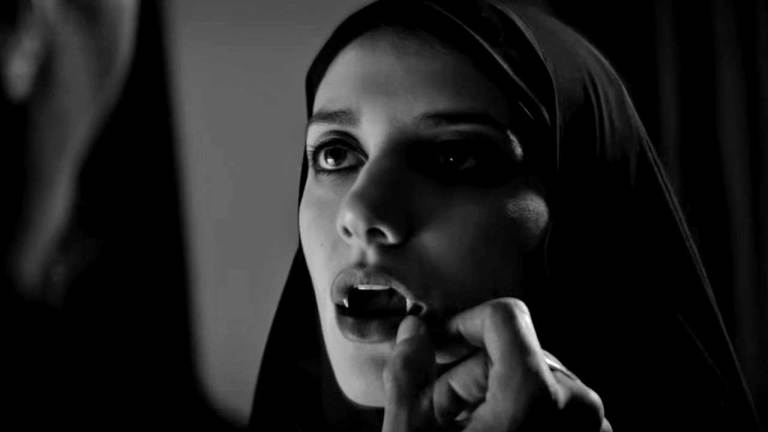
Iranian-American filmmaker Ana Lily Amirpour directed this Persian-language arthouse horror noir that was marketed as “the first Iranian vampire Western.” From the title, one might assume the movie may be centered around a woman in danger, but in this feminist masterpiece, she is the very thing to be feared. The titular Girl (Sheila Vand) is a skateboarding lonesome vampire living in a worn-down town. In Bad City, she is the judge and god, sinking her fangs into the flesh of bad men who deserve to be punished. When she meets Arash (Arash Marandi), a compassionate young man who lives with a father who has a drug addiction, The Girl becomes fascinated by him and begins to let her guard down. The black-and-white film feels like an absolutely gorgeous dream.
Tigers Are Not Afraid (2017)
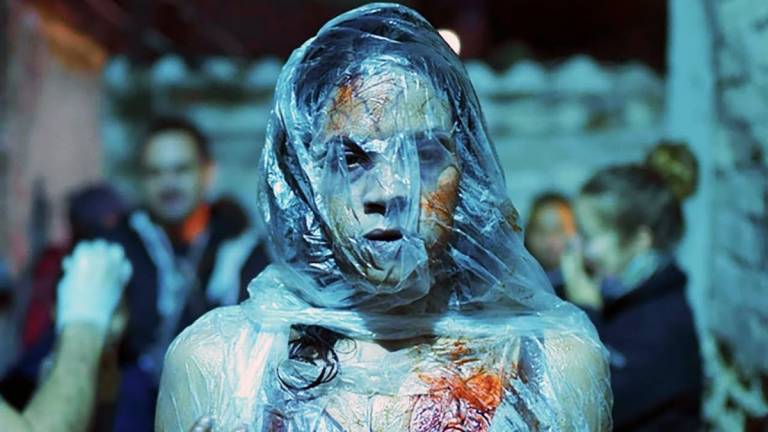
Tigers Are Not Afraid is written and directed by Issa López, the endlessly talented showrunner behind True Detective: Night Country. Tigers Are Not Afraid is a coming-of-age horror movie that takes the form of a dark fairy tale—parts ghost story and parts fantasy. Estrella (Paola Lara) is growing up in a cartel-ridden Mexican town where it’s the norm to have shoot-outs outside your classroom, know people who have disappeared, see dead bodies lying on the sidewalk, and have orphans living out alone on the streets. She comes home after school one day to find her mother missing. After days of no return, she seeks refuge with a group of unhoused orphan boys trying to survive the horrific violence that plague their city. The children’s lives spiral into a game of cat and mouse when Estrella discovers that the magic is real in three pieces of wish-granting chalk her teacher gave her. Tigers Are Not Afraid is a gorgeous tale that will absolutely devastate you.
Relic (2020)
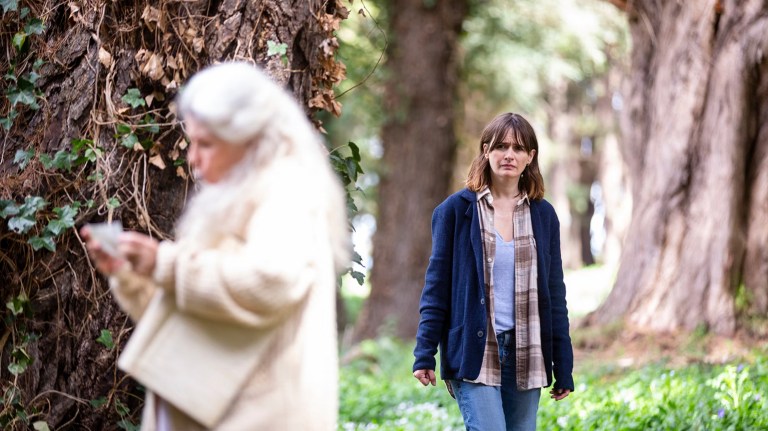
Japanese-Australian filmmaker Natalie Erika James co-wrote and directed this elevated horror about three generations of women who are brought together under one roof. Edna, an elderly and widowed matriarch, vanishes. Her daughter Kay (Emily Mortimer) and granddaughter Sam (Bella Heathcote) travel to the woodland family home to find her, only to find the door locked from the inside, inky black mold throughout the house, a loud creaking coming from inside the walls, and Post-its scattered all around with reminders of the most basic human tasks. Edna reappears making tea in the kitchen the next day, disheveled, muddied and barefoot. The simple explanation would be old age and diminished mental faculties, but something much darker is taking a hold of Edna.
Candyman (2021)
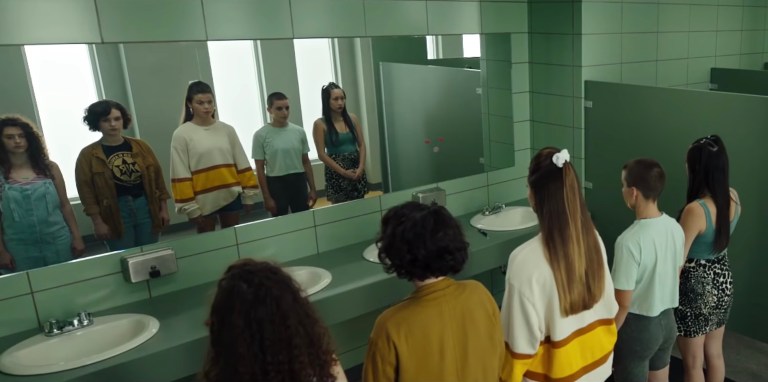
2021’s Candyman is a direct sequel to one of the greatest horror films of the 1990s. It debuted number one at the U.S. box office, making Nia DaCosta the first Black female director to achieve the honor. The urban legend comes back to life to protest police brutality and the enduring racialized violence against Black people in this country. The movie unfolds in the same Chicago neighborhood as the first movie, Cabrini-Green, now a symbol of gentrification and displacement. Anthony McCoy (Yahya Abdul-Mateen II), a Black artist struggling in a predominantly white art world, moves into one of the high-rise buildings that has replaced the former housing projects with his girlfriend Brianna Cartwright (Teyonah Parris), an art gallery director. When he learns about Candyman, he begins to unravel the figure’s dark history, unleashing a wave of terror. The ending of the supernatural slasher is one of the best subversions of the final girl trope.
Medusa (2021)

Brazilian writer-director Anita Rocha da Silveira brings to life a hypnotic condemnation of far-right politics, purity culture, and religious extremism in this visually mesmerizing film about a Christo-fascist cult. Mari (Mari Oliveira) is part of an Evangelical church that preaches far-right and misogynistic discourse and believes “secular government was a mistake.” The young men of the church, “the Watchmen of Sion,” act as their pastor’s de facto army. Flooded in pink and purple neons, the girls perform catchy conservative pop songs about wanting to be pretty housewives and praising the lord. At night, the teenage girls and young women act as a brutal vigilante gang, prowling the streets and violently punishing sinners, namely other women they’ve labeled as “whores” and “Jezebels.” After an attack gone wrong, Mari is forced to reflect on her actions and begins questioning her lifelong beliefs. In confronting her inner demons, she comes face to face with the internal misogyny that has always kept her shackled from knowing freedom.
Huesera: The Bone Woman (2022)
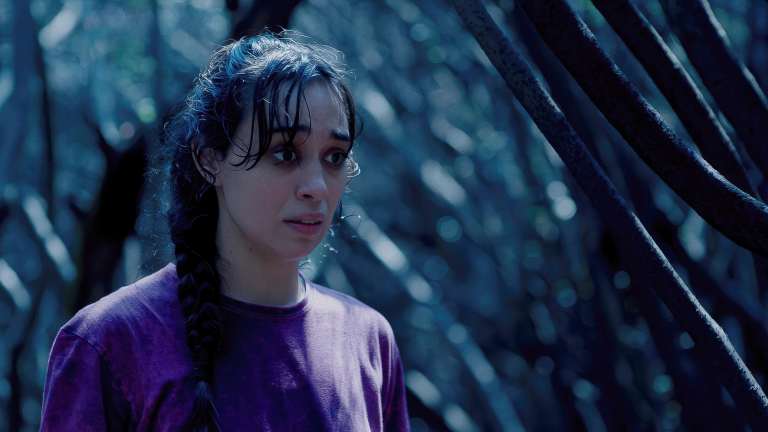
Mexican filmmaker Michelle Garza Cervera co-wrote and directed this uniquely bizarre Mexican-Peruvian supernatural movie that blends folk horror and body horror to depict the trauma and loss of identity that come with impending motherhood. Huesera is a slow-burn visceral experience that examines gender roles in Latin America, patriarchal views on motherhood, and compulsory heteronormativity. Valeria (Natalia Solián) is a queer woman with an anti-authoritarian past now trapped in an unfulfilling and heteronormative life in which she finds herself burdened by the weight of cultural and familial expectations. She has settled down with her husband Raúl (Alfonso Dosal), with whom she longs to have a baby. When she learns she’s pregnant, she starts being tormented by the titular bone-crunching entity who brings chaos into her life. As her pregnancy evolves, she struggles with the idea of becoming a mother and the supernatural creature becomes more vicious.
Watcher (2022)

Chloe Okuno made her feature debut writing and directing this atmospheric, claustrophobic masterpiece with an ending that’s all the female rage. In her most electric performance to date, Maika Monroe stars as Julia, an American woman who moves to Bucharest with her Romanian-American husband Francis (Karl Glusman), who works long hours. Home alone most of the time, she notices a neighbor from a building across the street watching her through the window daily. Meanwhile, a serial killer dubbed “The Spider” has been decapitating women in the area. Julia gets the sense she’s not only being watched, but stalked, and becomes more unnerved. Eventually, she comes to believe her neighbor’s responsible for the murders. The police, and even her own husband, try to convince her that it’s all in her head. With masterful camerawork, Okuno chillingly suggests that Julia is never alone—that someone is always watching. The director instills in the audience the same omnipresent sense of feeling trapped that Julia can’t shake. Watcher emphasizes the universal female experience of having your valid fears minimized and your intuition coded as hysteria.
Nanny (2022)
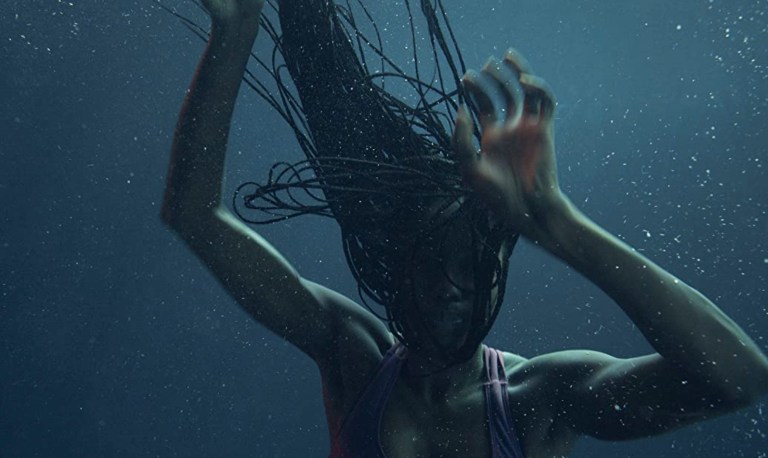
Nikyatu Jusu highlights the immigrant experience in this unflinching psychological horror about a Senegalese migrant nanny working for a white wealthy family in a home in the Upper East Side. She faces constant cruelty, racial aggressions, and exploitation of labor. Anna Diop stars as Aisha, the titular nanny who is working hard to save money to bring her six-year-old son Lamine (Jahleel Kamara) to live with her in New York City. As Aisha prepares for his arrival, she’s haunted by intense visions and frightening nightmares that threaten the new life she’s fought tooth and nail to construct.
More great horror films directed by women of color…
The Invitation (2015) Karyn Kusama is the director of this grief-centered psychological horror. Will (Logan Marshall-Green) and his girlfriend attend a dinner party hosted by his ex-wife and her current partner two years after the death of his son. As the night progresses, he becomes convinced his hosts have sinister intentions.
Dearest Sister (2016) is a film from Laos directed by Mattie Do and centered around a young woman who develops a degenerative eye disease and begins to communicate with the spirit world.
Good Manners (2017) Brazilian filmmaker Juliana Rojas co-wrote and co-directed this dark fantasy about a lonely nurse who is hired by a mysterious wealthy woman to be the nanny of her unborn child. With the full moon comes the birth of a werewolf pup.
The Long Walk (2019) is a Laotian horror drama directed by Mattie Do that focuses on an old man haunted by the spirit of a young woman whose death he witnessed fifty years earlier. With her help, he travels back in time to intervene in his unhappy childhood. The Critics Consensus on Rotten Tomatoes says the movie “may require patience from some viewers, but they’ll be rewarded with a thoughtful and alluringly atmospheric ghost story.”
Culture Shock (2019) Mexican filmmaker Gigi Saul Guerrero brings to life a story about a young Mexican woman who crosses the border into the U.S. only to discover that the American Dream is the biggest lie ever told. She must fight to save herself and others from the nightmare they find themselves living in.
Our Father, The Devil (2021) Ellie Foumbi directs this French thriller about a Guinean refugee whose life is disrupted when a charming priest arrives in town and she recognizes him as the warlord responsible for the slaughter of her family back home.
Master (2022) Mariama Diallo is the writer and director of this psychological horror about two Black women at an elite New England university. Gail Bishop (Regina Hall) becomes the school’s first Black master (head of college). Freshman Jasmine Moore (Zoe Renee) moves into a dorm room haunted by the university’s first Black student, who died by suicide in 1965.
Slash/Back (2022) Nyla Innuksuk co-wrote and directed this amazing Inuit sci-fi horror about a group of friends that link a series of local disappearances to an alien invasion, and become determined to fight back.
Totally Killer (2023) is a time travel slasher directed by Iranian-American filmmaker Nahnatchka Khan and starring Kiernan Shipka. 35 years after the Halloween murders of three teenagers, a killer returns to the small town of Vernon. 17-year-old Jamie travels back in time to 1987 and tries to save her mother’s group of besties.
Unseen (2023) Yoko Okumura makes her feature directorial debut in this movie about a gas station clerk who receives a phone call and must help a nearly blind woman survive her murderous ex in the woods.
Further reading:
